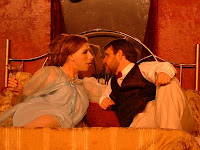by Jim Farmer, Southern Voice
 ATLANTA PLAYWRIGHT TOPHER PAYNE never expected it. Neither did Process Theatre artistic director DeWayne Morgan. But starting next week, the Process Theatre Company presents the “3 by Topher” Play Festival, a trio of world premieres penned by Payne. According to Morgan, the company mounts a festival each spring, and the timing was perfect, but it wasn’t planned.
ATLANTA PLAYWRIGHT TOPHER PAYNE never expected it. Neither did Process Theatre artistic director DeWayne Morgan. But starting next week, the Process Theatre Company presents the “3 by Topher” Play Festival, a trio of world premieres penned by Payne. According to Morgan, the company mounts a festival each spring, and the timing was perfect, but it wasn’t planned. “It wasn’t that we were looking to do a play festival of Topher’s work, but he had three plays written at the time,” he says.
“The Perfect Arrangement” is the gayest of the trio. In it, state department workers who have just helped get rid of communists are asked to now take care of “deviants” — in other words, homosexuals. What no one knows is that two of the employees are gay themselves, with marriages to cover their secret.
Payne got the inspiration from the Lavender Scare, which began in 1950 when 190 gay employees were fired from the government for security reasons.
“I’d never heard of it, and I consider myself reasonably savvy,” Payne says. “It seemed so ripe for a story. I did research, watching a lot of ‘50s sitcoms, getting that vocabulary down.”
 “ABOVE THE FOLD,” WHICH PAYNE describes as “dark and twisted and fabulous,” also contains gay content. “It’s about people on the periphery of news events no one ever bothered to interview,” he says. “They are hiding or ignored.”
“ABOVE THE FOLD,” WHICH PAYNE describes as “dark and twisted and fabulous,” also contains gay content. “It’s about people on the periphery of news events no one ever bothered to interview,” he says. “They are hiding or ignored.” Among the characters are two lesbian co-workers of a young man who later goes on a high school killing spree. Others include the gay makeup artist for a young woman in a coma about to make her TV debut; a woman who loses a beauty pageant; and a young man who has kept quiet about his relationship with a pop star.
Originally, “Above the Fold” was supposed to premiere in New York last year at a theater Payne tactfully refuses to name. According to Payne, the company loved the script and was anxious to produce it, but a donor who was a graduate of Virginia Tech felt uncomfortable with the shooter piece, claiming it was too sympathetic to the killer.
The theater wanted to cut that segment, but Payne balked and decided he would rather have it produced elsewhere. “These people do horrible things, but they are people,” Payne says. “Where did it come from? How do we understand that? I felt that scene drove the whole point home of what it was trying to communicate. I didn’t want to lose that.”
Besides directing “Above the Fold” and “Don’t Look at the Fat Lady,” Morgan is appearing in “The Perfect Arrangement.” He has long been a fan of Payne’s work.
“I think Topher’s main gift is that he is able to make his characters and their words sound so real,” Morgan says.
 THE FINAL SHOW is the comedy-drama “Don’t Look at the Fat Lady,” which is loosely based on the real life story of Gail Grinds, a 40-year-old woman who was confined to a sofa for two to five years, weighed 600 pounds and whose skin was literally stuck to the sofa. She died just after emergency workers rescued her.
THE FINAL SHOW is the comedy-drama “Don’t Look at the Fat Lady,” which is loosely based on the real life story of Gail Grinds, a 40-year-old woman who was confined to a sofa for two to five years, weighed 600 pounds and whose skin was literally stuck to the sofa. She died just after emergency workers rescued her. “Her whole life was reduced to a punchline, but she had a life,” Payne says. “I felt she deserved better. When I see someone who is overweight, [the tendency] is to say ‘how can you do that to yourself.’ It makes us look at our own prejudices towards fat people. I come from Mississippi, the fattest state in the country. We work hard to make fat people invisible,” he says.
Payne is also a weekly columnist for David Atlanta Magazine, a sister publication to Southern Voice.










